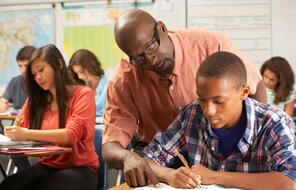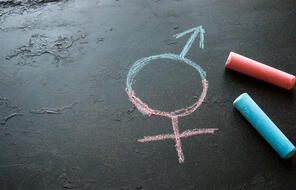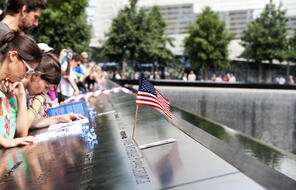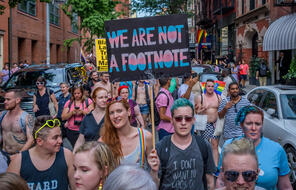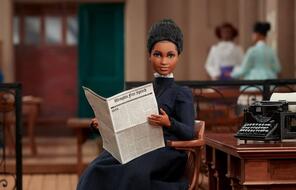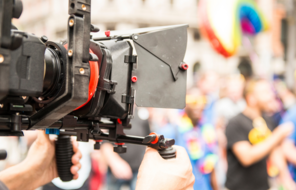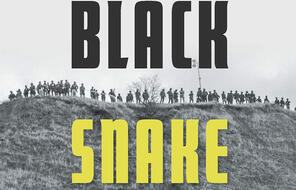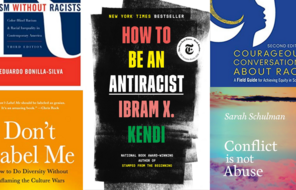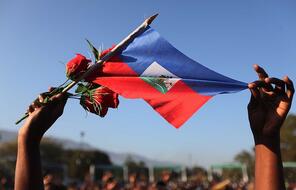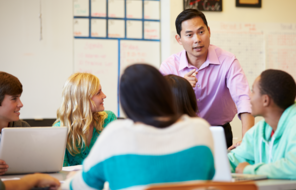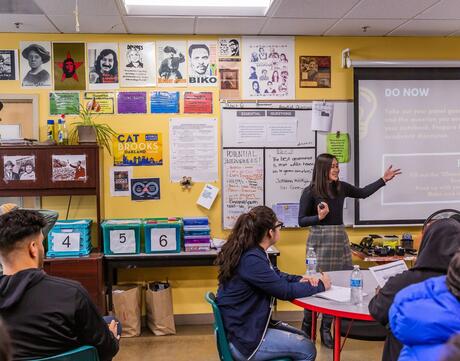
Why I Am the Educator I Dreamed of Becoming
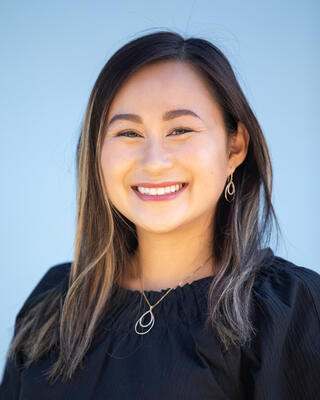
Hannah Nguyen
Facing History Educator & Director of Diversity, Equity, Inclusion, and Justice at Castilleja School
"Know history, know self. No history, no self."
This quote hung on the wall above my whiteboard in my Ethnic Studies classroom. I also chose to title my course with this quote, which is actually a loose interpretation of a quote by José P. Rizal: Ang hindi lumingon sa pinanggalingan ay hindi makarating sa paroroonan. (Translated from Tagalog: A person who does not look back to where he came from would not be able to reach his destination.)
My teaching philosophy is deeply informed by my reflections on where I came from, where I have been, and the wisdom I have gathered along the way from family, friends, teachers, and most of all, my students. My journey begins with my hatred, not love, of history class.
____________________
In education, the expression “lightbulb moment” is commonly used to denote when something clicks and a student successfully grasps a concept. I experienced many “lightbulb moments” in my math and science classes but tended to dwell in darkness in my least favorite subject: History. I cared the least about History class for much of my primary and secondary education. I did not feel connected to what I was learning, let alone recognize its very real impact on my life or my community. Whereas I felt warm excitement in the light of my STEM classes, I felt emptiness in the hollow words of my history textbook.
Thankfully, I am not writing for Facing History & Ourselves about how much I dislike history. I am writing about how Facing History transformed me as a student and ultimately, an educator.
It Began in a Facing History Classroom
During my sophomore year my high school, Notre Dame San Jose, adopted Facing History & Ourselves curriculum in their History, English, and Religious Studies curriculum. The lessons from Holocaust and Human Behavior were particularly impactful. Using primary sources and personal reflections, we examined the challenging history of the Holocaust and explored questions about human choices and how they shape our world. Because I was learning this history through the lens and voices of those who directly experienced it, for the first time I felt a deep emotional connection to history and its real-world implications. It was no longer about memorizing an array of dates and names for a test, but about exploring the lived experiences and unimaginable circumstances endured by real people with real stories.
I remember feeling shocked and disgusted at the dehumanization of Jewish people and other marginalized groups. I also saw parallels to the racism and xenophobia that still exist in our society today. It made me realize that history is not just a distant memory: it shapes the world we live in now.
I discovered that even in the face of unfathomable darkness, there are individuals who rise above and stand up for justice. These lessons challenged me to confront my own biases and to make choices that actively work towards creating a more just society.
This was the year that I answered my calling to become an educator. At the age of 14, a fire had ignited within me, fueled by the rage and conviction I felt in my Facing History lessons. I knew then that I wanted my future students to experience history the way I did – not just learning it, but finding connection to it, understanding how it relates to their world, and discovering the power they have to make choices and ultimately, history.
Transforming the Way I Learned History
My journey of connecting with history stems from my own experiences as a second-generation Vietnamese-American and daughter of Vietnamese refugees who learned two very different stories of the Vietnam War from her parents and her History textbook. In my high school US History class, I had to sit and read a chapter about the War told from an ethnocentric perspective that centered American self-interest and reduced Vietnamese identity down to a single war. While the textbook was explaining an event that belonged to my past, I didn’t feel as though I belonged to it. It failed to explain my parents’ painful stories and silences that littered my childhood. It also failed to include the occasional joyful memories they shared of growing up in Vietnam as working children who ran around the fields from which they harvested.
Because of Facing History’s framework I was given a chance to interview my parents and learn a fuller picture of the Vietnam War through their stories. History was a subject I absolutely dreaded, until I was finally able to see how it lives and breathes beyond the pages of a textbook or a multiple-choice test. More importantly, I started to see myself in history and make sense of why my people’s stories were forgotten in traditional Vietnam War curriculum. These conversations with my parents were incomprehensibly difficult, but they were critical in transforming my understanding of my history and myself.
As much as I tried to hate history, I realized that I couldn’t escape it. I will always belong to this history of loss, trauma, and resilience. But knowing that I could reclaim this history and share and explore this part of my identity gave me a sense of empowerment. I realized that if my parents’ stories and others like it were not remembered, then there must be so many more narratives and voices of witness that are forgotten in a History curriculum that centers hegemonic perspectives. The initial dissonance I felt in US History class coupled with the opportunity to explore my family history through intergenerational dialogue were the first of many transformative experiences that would forge my electric connection to history and spark my growth into a History/Social Science educator, one dedicated to remembering and uplifting these forgotten counter and critical narratives.
My Journey as an Educator
While I have a vivid imagination, I never once imagined myself becoming a history teacher. Throughout my education, my alienation from the traditional history curriculum, curiosity about my own cultural history, and imagination of what learning history could look like have fueled my drive as an educator. I am focused on creating empowering spaces for students to connect with their own histories and the experiences of others, especially marginalized stories. At the end of the day, it is my love for imagination and sharing that love with young people that draws me to the classroom. As a history teacher, I push students to understand that the world was shaped by people who came before, and that it can be reimagined and reshaped into something new. I challenge my students to truly face our history with courage and compassion and understand the power in using the lessons of the past to imagine and build a better, more equitable world.
Today, because of Facing History and my incredible teachers, I am proud to say that I am the educator I dreamed of becoming when I was in high school.
Reflecting on my journey with Facing History – past, present, and future – has illuminated a core reason why I am an educator. I often hear that the “lightbulb moments” I mentioned earlier are the moments that teachers chase, the ones that make it all worth it. As an educator, I do know the joy that comes with witnessing these moments, seeing that switch flip and the wires connect, and hearing a triumphant “Ohhhhh, I get it now!” But I would argue that they aren’t the reason I do what I do.
The moments that energize me as an educator are the sparks of passion, the embers of hope, and the fires to ask more questions and create change. It’s the moment during a lesson on Reconstruction and the legacy of racial injustice in our modern justice system when my Ethnic Studies class cries out, “What the heck? That’s messed up,” shortly followed by a, “Why did this happen? And how can we change things?” Or when a student interviews a community activist about the displacement happening in Oakland and asks, “What can I do?” Or when my student leaders create an action plan to reimagine campus accessibility and equity and ask, “Who can we work with to make this happen?”
In my Ethnic Studies class, students actively engage with primary sources, oral histories, academic controversies, and community narratives to explore the experiences of ethnic and other marginalized communities that are rarely represented in mainstream US History textbooks. They develop a deep awareness of self and their relationship to history, society, power, and change. In honoring those who came before us and the roles they took in fighting for social justice and collective liberation, I aim to equip my students with a critical lens to see the world and their place in it, and the analytical literacy to begin writing the role that they play in transforming their community and making history.
In a time where so many try to dim our students’ light and keep future generations in the dark, beyond chasing light bulb moments, I hope that we will nurture the sparks, fan the flames, and fuel the fire within our students, encourage their relentless pursuit of answers, their audacious dreams, and their unwavering commitment to making a difference.

